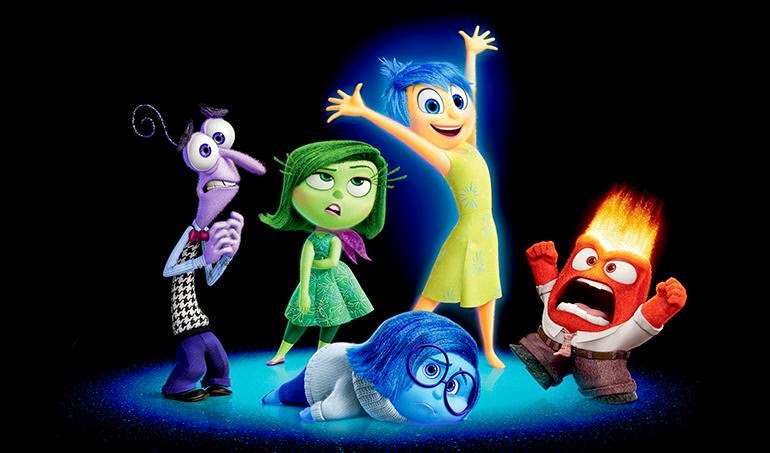By now, Pixar’s latest animated film, Inside Out, has probably replaced your child’s obsession with Queen Elsa. Okay, that’s a stretch, but adults just loved it, right? Full of creative, but, scientifically accurate information about the workings of the brain, Inside Out has become a go-to teaching tool for therapists everywhere.
In a nutshell, the movie follows a young girl, Riley, and the five emotional manifestations living in her mind: Joy, Sadness, Anger, Fear, and Disgust. These characters guide her through life experiences which she internalizes as core memories attached to a feeling. She stores these experiences in a core memory hub that powers islands making up her personality. As the audience, we watch her emotional manifestations turn as many experiences as they can into positive memories. Along the way, Riley matures and learns valuable life lessons.
Here are three key takeaways from Inside Out that can help you become a better parent and person.
1. Take care of your child’s inner islands. Every time Riley expresses something that connects with one of her Islands of Personality, that specific island activates. A traumatic event causes her core memory to be threatened, making her feel disconnected from her happiness. Riley then questions if she’ll ever return to how things were in the past, and as her islands collapse, her emotions become overwhelmed.
As you reflect on your child’s Islands of Personality, ask yourself: What inspires her? What does she value most? What makes your child light up with happiness?
At first, you may identify popular movies or cartoons. Continue by digging deeper to find what connects your child to the inner workings of her personality. Maybe she gravitates toward fantasy and creativity. Or, she connects with others in a special way. For example, one of Riley’s islands, Goofball Island, activates when she can be silly with others. Don’t forget these little interactions that make your child smile.
By accessing your child’s Islands of Personality, you can help her become familiar with her inner self. And, you can support her in using these Islands as resources to draw strength from when life gets tough.
2. Recognize that sometimes to win, you’ve got to lose. Riley experiences a traumatic event that creates chaos in her brain. As a result, Joy and Sadness get lost in the maze of Riley’s memories. They meet Bing Bong, Riley’s childhood imaginary friend. Along the way, Bing Bong realizes that the only way Joy can successfully return home is by sacrificing himself, thus, representing Riley’s loss of childlike innocence, as she matures.
As a parent, much of your efforts go toward assuring that your child’s life is easier than your own was. You do everything in your power to secure her success. But, feeling grief in life is inevitable – and it’s essential for allowing your child to realize she can take nothing in life for granted. Experiencing loss teaches children many valuable lessons, such as: learning to appreciate the value of things in her life; gaining a sense of resilience by overcoming grief and loss; improving confidence in herself and her ability to stay strong.
So, when your child faces loss, resist the urge to make her feel better right away. Experiencing these difficult emotions is essential for her emotional development. Support your child by allowing her to feel validated as you show and express your support. Only by accepting grief can your child overcome it. And as your child processes her loss with you, she’ll gain a deeper sense of strength and appreciation.
3. Embrace that all feelings are important. Riley’s inner character, Joy, is the first to make her appearance in the movie. She enjoys seeing baby Riley’s parents doting on her. But, Sadness makes an appearance before Joy is ready. Soon after, the other emotions join. In the beginning, everyone agrees that Joy should be in charge. They turn to her for help as she saves the day again and again.
As a parent, you are many things to your child – one of which is problem- solver. Your child relies on you for this mentoring and turns to you when Anger, Sadness, Fear, or Disgust show up. Your child doesn’t like feeling these emotions, and they make her behave in ways that can often be frustrating. So, what’s the easiest solution? Put Joy in control! Find a way to make your kid happy again, right?
While joy is very important, all emotions are equally essential to your child’s survival and ability to achieve a fulfilled life. When your child doesn’t learn to use those uncomfortable feelings to her advantage, she becomes overwhelmed and loses control. You can bring your child back to joy while also embracing her when you do the following: acknowledge and accept her emotions, even if you don’t agree with them; give yourself time to sit with your child’s feelings before trying to change them and let her process how she feels before making any decisions; ask questions about what makes her feel a certain way and validate her feelings by showing acceptance.
 When you support your child by accepting all her feelings, she will learn not to become overwhelmed. Better yet, your child will learn to use anger to keep life fair, sadness to connect with others, fear to stay safe, disgust to guide her decisions, and joy to experience happiness.
When you support your child by accepting all her feelings, she will learn not to become overwhelmed. Better yet, your child will learn to use anger to keep life fair, sadness to connect with others, fear to stay safe, disgust to guide her decisions, and joy to experience happiness.
By teaching your child to use her emotions as resources – rather than avoiding these feelings – she will grow into a kind, responsible, and emotionally adjusted adult.




